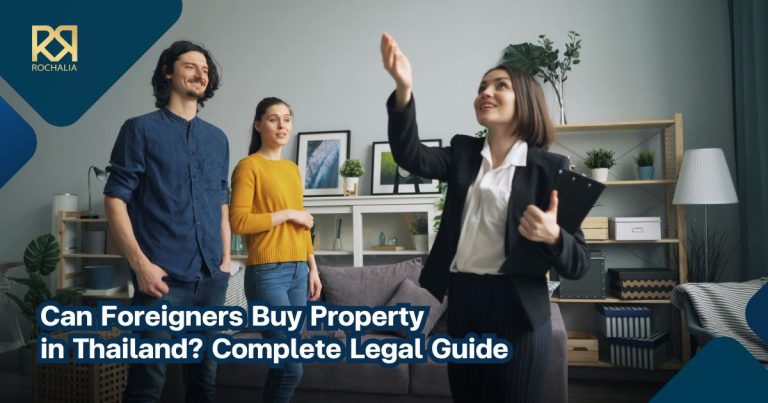How to Buy a House in Thailand: A Complete Guide for Foreigners

Thailand has become one of the most attractive destinations for expats, retirees, investors, and digital nomads looking to settle or invest in property. From modern city living to peaceful countryside residences, the country offers diverse housing options across many regions.
However, many buyers, especially foreigners often feel confused about the legal structure, ownership rules, and buying process. A common question people ask is: can foreigners buy houses in Thailand legally? Understanding the regulations, processes, and legal frameworks is essential before making any decision.
This guide explains how to buy a house in Thailand step by step, covering ownership laws, options for foreigners, common mistakes, costs, and practical tips to help you make safe and informed property decisions.
Understanding Property Ownership Laws in Thailand
Property ownership in Thailand is regulated by specific legal frameworks that clearly separate land ownership, building ownership, and condominium ownership.
- Thai nationals can legally own both land and houses.
- Foreigners are generally restricted from owning land directly.
- Condominiums can be foreign-owned under the foreign quota system.
- Houses (structures) can be owned, but land ownership requires special legal arrangements.
This legal separation is the foundation of Thailand’s property system and directly affects how both locals and foreigners can buy houses.
Can Foreigners Buy Houses in Thailand? (Legal Reality Explained)
So, can foreigners buy houses in Thailand?
The short answer is: foreigners cannot directly own land, but there are legal structures that allow them to legally control or use property.
Foreigners can:
- Own condominium units (within foreign ownership quota limits)
- Own buildings (structures) without owning the land
- Legally lease land and property (long-term leasehold)
- Use legal rights such as superficies or usufruct
- Invest through properly structured legal entities (with strict compliance)
Foreigners cannot:
- Directly own freehold land in their personal name
Because of this structure, buying a house in Thailand as a foreigner requires proper legal planning and professional guidance.
How to Buy a House in Thailand: Step-by-Step Process
Understanding how to buy a house in Thailand starts with knowing the full buying process:
- Property Search – Choose location, type, and budget
- Legal Due Diligence – Verify title deeds, zoning, and ownership history
- Ownership Structure Setup – Thai ownership, leasehold, or legal structure for foreigners
- Price Negotiation – Agree on terms and conditions
- Contract Signing – Reservation agreement and sales contract
- Deposit Payment – Secure the transaction
- Transfer at Land Office – Legal ownership registration
- Tax and Fee Settlement – Transfer fees, stamp duty, withholding tax
- Utility Registration – Electricity, water, internet
- Move-in Process – Final inspection and handover
Each step requires careful verification to avoid legal and financial risks.
Buying a House in Thailand as a Foreigner: Available Options
Foreign buyers typically use one of the following legal structures:
- Leasehold property (long-term legal lease)
- House ownership without land ownership
- Thai spouse ownership structure
- Investment structure
- Corporate structure (legally compliant setup)
Each option has different legal, financial, and risk implications. Choosing the right structure depends on long-term goals, investment plans, and residency status.
Common Mistakes When Buying Property in Thailand
Many buyers make costly mistakes due to lack of local knowledge:
- Not verifying land title deeds
- Using illegal nominee structures
- Skipping legal due diligence
- Trusting verbal agreements
- Ignoring zoning regulations
- Overlooking infrastructure access
- Not planning long-term maintenance costs
These mistakes often lead to legal disputes, financial loss, and ownership complications.
Costs and Fees When Buying a House in Thailand
Typical costs include:
- Land transfer fees
- Stamp duty
- Withholding tax
- Legal service fees
- Agent commissions
- Utility setup costs
- Long-term maintenance expenses
Understanding total ownership cost is crucial for budgeting and investment planning.
Is Buying a House in Thailand a Good Investment?
Thailand offers strong investment potential depending on location and strategy:
- High rental demand in major cities and tourist hubs
- Growing expat and foreign buyer markets
- Long-term value appreciation in prime locations
- Tourism-driven property demand
Cities like Chiang Mai are especially popular for both living and investment, with growing interest in residence chiang mai, house for sale chiang mai, and house for rent chiang mai due to affordability, lifestyle quality, and strong rental demand.
Frequently Asked Questions About Buying a House in Thailand
Get Professional Help to Buy a House in Thailand Safely
Buying property in Thailand can be a smooth and secure process when done legally and professionally. Understanding ownership laws, choosing the right structure, and following proper procedures are essential for protecting your investment.
If you’re planning how to buy a house in Thailand and want a safe, transparent, and legally compliant process, working with experienced property professionals can help you avoid risks and make confident decisions for long-term success.


